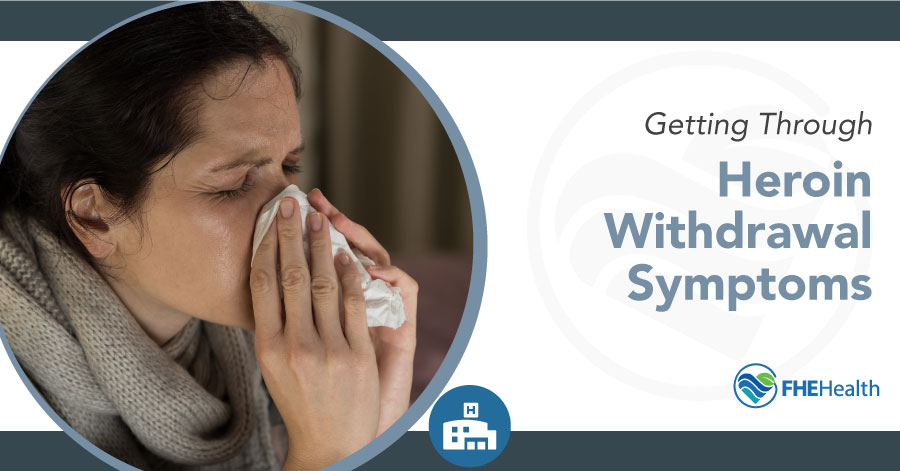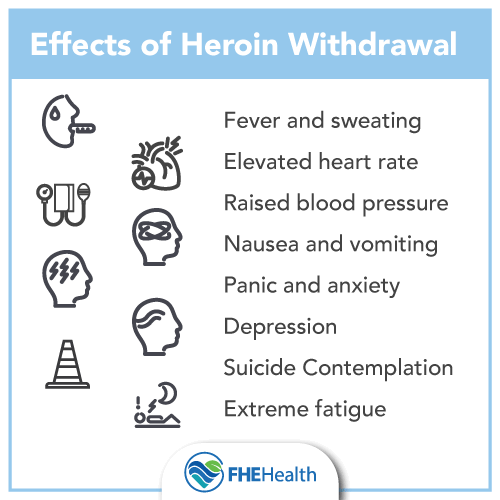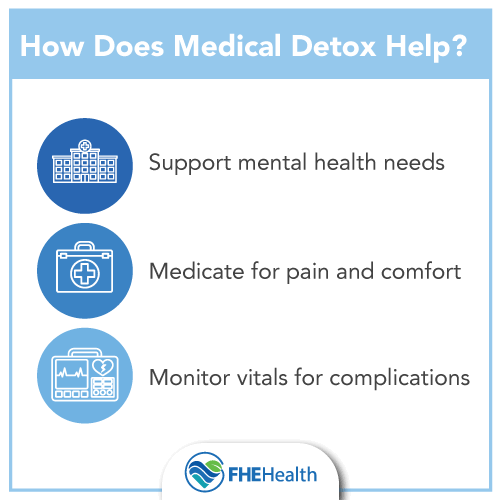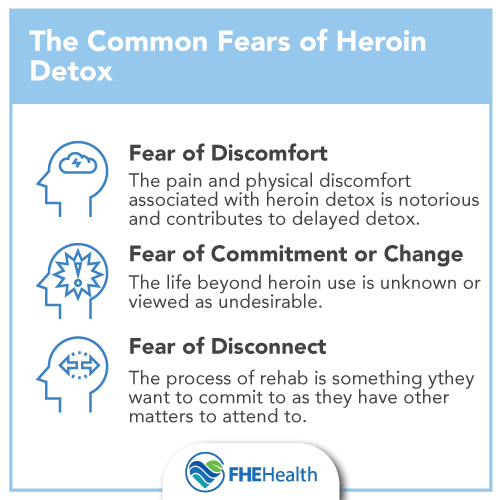
Updated March 8th, 2020
Heroin is known for its extremely addictive qualities and is notoriously difficult to quit. There are a number of harrowing, even exaggerated, depictions of withdrawal in TV, film and other media. Consequently, heroin and other opiates have developed a reputation for being very difficult to give up. The severity of heroin withdrawal symptoms can be a source of fear for people considering entering recovery.
So, what’s it like detoxing from heroin? What are some of the most common fears among patients in heroin detox? Can you die from heroin withdrawal?
The good news is that a quality detox center like FHE Health will take great care to address this fear and others, so that patients feel fully supported throughout withdrawal and beyond. In other words, while pre-detox fears are natural and can be common, they don’t justify the perpetuation of an addiction that’s destroying one’s health, life, and relationships.
This article will address common fears among patients in heroin detox. It will also discuss how patients are able to overcome these fears during inpatient rehab, with the help of highly trained and compassionate staff.
What Is Heroin?
Heroin is a highly addictive drug made from morphine, a psychoactive molecule obtained from the resin of the seed pod of the opium poppy plant. The color and appearance of heroin are determined by how it’s manufactured and what else it may be combined with. It might come in the form of white or brown powder or a black, sticky material known as black tar heroin.
Heroin can be consumed in a variety of ways, including intravenously, smoked or through the nose. Due to its highly addictive nature, it can be exceptionally difficult to quit. Heroin is an opiate that affects the brain in a different way than many other drugs. After a short period of consistent use, these drugs change the brain’s chemistry, rendering the brain unable to function normally.
Heroin Withdrawal Symptoms
 The physical and mental heroin withdrawal symptoms occur after an individual has been using consistently for some time and then suddenly stops. The severity of the symptoms is often what leads individuals to keep seeking another fix in order to “get well.” Some heroin withdrawal symptoms include:
The physical and mental heroin withdrawal symptoms occur after an individual has been using consistently for some time and then suddenly stops. The severity of the symptoms is often what leads individuals to keep seeking another fix in order to “get well.” Some heroin withdrawal symptoms include:
- Fever and sweating
- Elevated heart rate and blood pressure
- Nausea and vomiting
- Panic and anxiety
- Depression and thoughts of suicide
- Extreme fatigue
- Nervousness
- Muscle spasms
- Shaking
- Severe drug cravings
- Abdominal pain
How Long Do Heroin Withdrawal Symptoms Last?
The duration and severity of heroin withdrawal symptoms may vary. Withdrawal symptoms usually start 6 to 12 hours after the last dosage, peak in 1 to 3 days and then go away over 5 to 7 days. However, some users suffer from post-acute withdrawal syndrome (PAWS), which can last weeks or months.
The Pain of Heroin Detox
There are anecdotal stories of individuals who seemingly sail through the withdrawal process without suffering much at all. Contrastingly, there are many anecdotal stories telling of a totally opposite experience. Many recovered people describe their past withdrawal as unbearable or unimaginably painful.
It’s highly advised to go into heroin detox with the mindset of being medically prepared. Being monitored by addiction treatment professionals during the entire detox period ensures the greatest comfort and safety and increases the likelihood of success.
Dangers of Heroin Withdrawal
Many people wonder: Can you die from heroin withdrawal? Contrary to popular belief, heroin detox actually has a very low fatality rate. It’s unlikely that an otherwise healthy individual would die from heroin withdrawal symptoms.
Withdrawing from heroin isn’t considered as dangerous as abruptly quitting substances like alcohol or benzodiazepines. Unsupervised withdrawal from these drugs is often fatal.
While detoxing from heroin doesn’t pose a massive threat to your life, the detox process from a narcotic as powerful as heroin may cause some complications. According to medical addiction treatment experts, most people withdrawing from heroin won’t die from it; however, they could die from untreated complications, such as severe dehydration, vomiting or diarrhea.
Can You Detox From Heroin at Home?
One of the most difficult parts about quitting a drug without medical supervision is not having any defense against the cravings. During withdrawal from heroin, cravings become extremely severe. So, while it’s technically possible to undergo heroin detox alone, getting professional help will vastly increase the likelihood of success.
What is Heroin Medical Detox
 Medical detox refers to the process of removing hazardous addictive chemicals from the body while under the care of a team of competent medical specialists. Nurses, clinical personnel and therapists normally make up this team, which is led by a physician. This way, health risks can be mitigated before they present danger to a patient, and addiction specialists can ensure a thorough and effective detox.
Medical detox refers to the process of removing hazardous addictive chemicals from the body while under the care of a team of competent medical specialists. Nurses, clinical personnel and therapists normally make up this team, which is led by a physician. This way, health risks can be mitigated before they present danger to a patient, and addiction specialists can ensure a thorough and effective detox.
How Prescribed Medications Can Aid the Detox Process
Even with the presence of medical supervision, heroin detox isn’t easy. However, luckily, many withdrawal symptoms may be lessened by medical intervention and a comfortable environment.
In the past few decades, research has changed the way we view medication as a means to manage recovery from addiction to a variety of substances. While methadone is still used in recovery for heroin and opiate addiction, drugs like buprenorphine and suboxone® are becoming the gold standard for care.
What Are Buprenorphine and Suboxone®?
Buprenorphine is a groundbreaking drug that received its final FDA approval in 2002. It’s a partial opioid agonist, meaning it competes for the same receptors in the brain as heroin, morphine, prescription opioids and other drugs of the same class. It dulls the effect of heroin and lessens cravings and other withdrawal symptoms.
Suboxone® combines the benefits of buprenorphine with naloxone, a substance that limits the abuse potential of the drug.
Common Fears About Heroin Detox
 Heroin withdrawal has often been depicted in movies and books as an inhuman and unbearable experience. A lot of negative imagery has built up about heroin recovery, and many people cite the fear of withdrawal as a primary factor preventing them from quitting. So, what exactly are they afraid of?
Heroin withdrawal has often been depicted in movies and books as an inhuman and unbearable experience. A lot of negative imagery has built up about heroin recovery, and many people cite the fear of withdrawal as a primary factor preventing them from quitting. So, what exactly are they afraid of?
Fear of Pain and Discomfort
Heroin withdrawal symptoms may last up to 7 to 10 days as the addictive narcotic leaves the body. During this period, a lot of pain and discomfort is experienced, and people often find themselves unwilling to face recovery as a result.
Fear of Change
A central part of overcoming heroin addiction involves making a firm commitment to changing lifestyles and habits and severing relationships with old ties. Yet without embracing the prospect of making the necessary life changes, there can be no recovery from addiction. Many fear they won’t recognize or like the person they become post-recovery and feel they’re letting a part of themselves go.
Fear of Isolation
Overcoming addiction to heroin means spending time away from normal life, including interactions with loved ones. The fear of being isolated and out of the loop is often a barrier to those contemplating recovery.
Overcoming Fear of Detoxing From Heroin
Fear is a natural emotion to feel when undergoing changes and developments in life. This is especially true when those changes are likely to involve a certain level of pain and isolation from others. It’s important to remember that regardless of what it is you’re afraid of experiencing, it will pass shortly.
While the duration of heroin withdrawal may feel much longer when actually undergoing it, it’s not that long in the grand scheme of things. Keeping this in mind and celebrating each day of success can aid you in overcoming the fear you might be feeling.
Ready to Take That Important Step?
Heroin is a highly addictive drug that’s notoriously difficult and uncomfortable to quit. Heroin addiction greatly affects your quality of life, interpersonal relationships and ability to function properly. While heroin withdrawal symptoms are tough and grueling, unlike alcohol or benzodiazepines, they’re unlikely to kill you.
Giving up heroin alone is technically possible, but under the supervision of trained addiction professionals, the likelihood of success is greatly increased. Addiction professionals can ensure a comfortable and safe environment for detoxing, make use of medical intervention to ease symptoms and provide emotional support.
FHE Health provides heroin recovery patients with 24/7 support during recovery. Our team of trained medical and psychological professionals can make the process smoother by decreasing discomfort and providing care. To learn more about heroin detox at FHE Health, contact us today.






